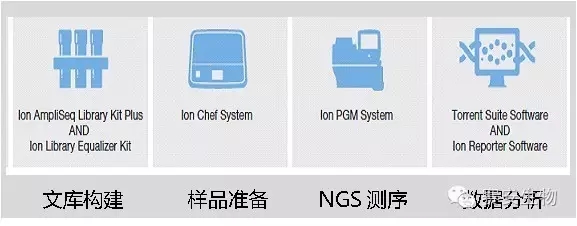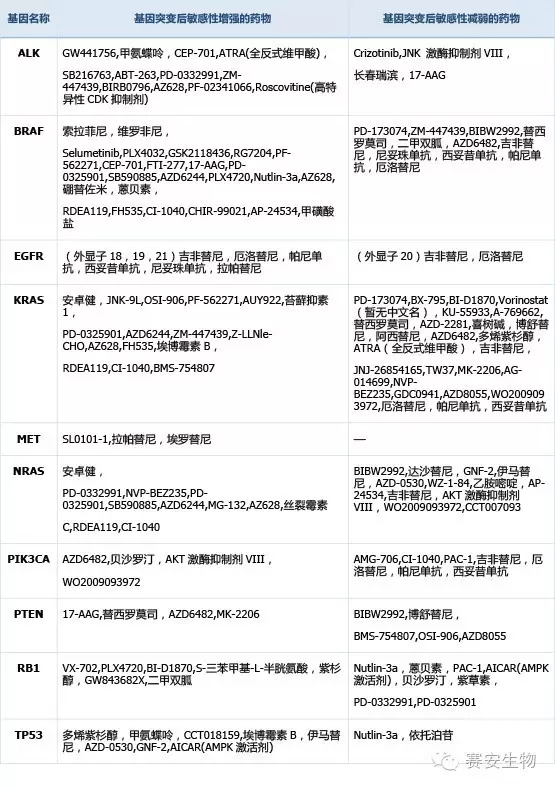登陆有奖并可浏览互动!
您需要 登录 才可以下载或查看,没有账号?立即注册


×
— 近三年多篇文献报道:可为肿瘤精准医疗提供参考 — 2016ASCO摘要:ctDNA与肿瘤组织的一致性可超过80%
1检测意义癌症相关基因的突变可导至基因的功能紊乱,这是绝大多数恶性的诱因。同时,基因突变也是癌症诊断、预后及药物疗效预测的重要生物学标志。应用二代测序技术可以同时对多个癌症相关基因进行突变检测,从而得到很多相关位点的突变信息。通过对癌症相关基因进行突变检测,患者可以得到重要的个人基因信息,这些信息与自身肿瘤的发展密切相关,并且可以为肿瘤的个体化精准治疗提供一个更为可靠的参考标准。 本检测涵盖了50个重要癌症相关基因的2855个已知突变热点, 这些位点与肿瘤治疗的效果和预后密切相关。
2检测方法
肿瘤相关50基因检测是以二代测序技术为基础的针对性突变检测,应用lon AmpliSeq 试剂盒对样本中的DNA进行多重PCR扩增,。在lon Torrent Personal Genome 测序仪平台上进行检测,测序结果通过Torrent Suite 软件进行分析。

检测流程
3应用方向
>>>>突变鉴定 该方法目前已运用在等恶性肿瘤突变热点筛选鉴定[1]和个性化治疗[2]中得广泛应用和研究,在非小细胞肺癌[3]、食管癌[4, 5]、胃癌[6]、结直肠癌[7, 8]、髓样甲状腺瘤[9]、转移胃肠神经内分泌瘤[10]、转移性黑色素瘤[11]、骨髓纤维瘤[12]、儿童侵袭性纤维瘤[13]的肿瘤组织的驱动突变鉴定或疗效及预后评估均已有相关文献报道。
>>>>液体活检 除了用于组织标本的检测,肿瘤相关50基因检测也可用于液体活检中的基因突变鉴定。用该检测分别检测乳腺癌患者外周血游离DNA和组织中的突变情况,一致率可达76%[14];2016年ASCO年会中最新发布的摘要指出,该检测对肺癌患者的肿瘤外周血游离DNA和组织样本分别进行检测,检出突变的一致性为70.66%,在III期肺癌患者中一致性可达80.36%[15],早期(I期及II期)肺癌患者中的一致性也在60%以上[15, 16]。 图片:乳腺癌患者肿瘤组织与外周血中检出突变的一致率为76%[14]
4检测基因
5检测样本
6检测周期
收到样本后10个工作日
7与药物敏感性变化相关的热点基因突变

参考文献 [1]Singh RR, Patel KP, et al. Clinical validation of a next-generation sequencing screen for mutational hotspots in 46 cancer-related genes. J Mol Diagn. 2013 Sep;15(5):607-22. [2]Uzilov AV, Ding W, et al. Development and clinical application of an integrative genomic approach to personalized cancer therapy. Genome Med. 2016 Jun 1;8(1):62. [3] Fujita S, Masago K, et al. Validation of an Ion Torrent Sequencing Platform for the Detection of Gene Mutations in Biopsy Specimens from Patients with Non-Small-Cell Lung Cancer. PLoS One. 2015 Jun 15;10(6):e0130219. [4]van Nistelrooij AM, van Marion R; et al. Early onset esophageal adenocarcinoma: a distinct molecular entity? Oncoscience. 2016 Feb 1;3(1):42-8. [5]Zheng H, Wang Y, et al. TP53, PIK3CA, FBXW7 and KRAS Mutations in Esophageal Cancer Identified by Targeted Sequencing. Cancer Genomics Proteomics. 2016 05-06;13(3):231-8. [6]Kim S, Lee J, et al. High-throughput sequencing and copy number variation detection using formalin fixed embedded tissue in metastatic gastric cancer. PLoS One. 2014 Nov 5;9(11):e111693. [7]Zhang L, Chen L, Sah S, et al. Profiling cancer gene mutations in clinical formalin-fixed, paraffin-embedded colorectal tumor specimens using targeted next-generation sequencing. Oncologist. 2014 Apr;19(4):336-43. [8]Simbolo M, Mafficini A, et al. Next-generation sequencing for genetic testing of familial colorectal cancer syndromes. Hered Cancer Clin Pract. 2015 Aug 21;13(1):18. [9]Ji JH, Oh YL, et al. Identification of Driving ALK Fusion Genes and Genomic Landscape of Medullary Thyroid Cancer. PLoS Genet. 2015 Aug 21;11(8):e1005467. [10]Kim ST, Lee SJ, et al. Genomic Profiling of Metastatic Gastroenteropancreatic Neuroendocrine Tumor (GEP-NET) Patients in the Personalized-Medicine Era. J Cancer. 2016 May 25;7(9):1044-8. [11]Pinto R, De Summa S,et al. The next generation of metastatic melanoma: Uncovering the genetic variants for anti-BRAF therapy response. Oncotarget. 2016 Feb 3. doi:10.18632/oncotarget.7175. [Epub ahead of print] [12] Tenedini E, Bernardis I, et al. Targeted cancer exome sequencing reveals recurrent mutations in myeloproliferative neoplasms. Leukemia. 2014 May;28(5):1052-9. [13]Meazza C, Belfiore A, et al. AKT1 and BRAF mutations in pediatric aggressive fibromatosis. Cancer Med. 2016 Jun;5(6):1204-13. [14]Rothé F, Laes JF, et al. Plasma circulating tumor DNA as an alternative to metastatic biopsies for mutational analysis in breast cancer. Ann Oncol. 2014 Oct;25(10):1959-65. [15]Yang F, Chen KZ, et al. Comparison between circulating tumor DNA and tumor tissue multiple gene detection in non-small cell lung cancer patients by targeted sequencing with the Ion PGM and AmpliSeq Cancer Panel. J Clin Oncol. 2016;34: suppl; abstr 8544. [16]Chen KZ,Lou F, et al. Circulating tumor DNA detection in stage I non-small cell lung cancer patients by targeted sequencing. J Clin Oncol. 2016;34: suppl; abstr 8514.
来源:赛安生物
|  /3
/3 